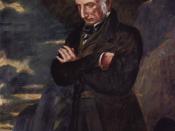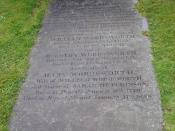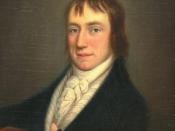A short Petrarchan sonnet by William Wordsworth, "London, 1802" is a poem filled with creative symbols that portray Wordsworth's emphasis on feeling and passion with natural morality and goodness. In the poem, Wordsworth's ideal vision of life was that he believed anyone could participate in it, if only they placed effort into what they were doing. In "London 1802," he uses a dramatic tone combined with frustration because he wants to stand from an ethical perspective yet exert more aesthetic influence rather than just social influence.
"London, 1802" speaks of a dead man, John Milton who was once known as a powerful poet who had great influence to those that knew him. Wordsworth wishes for Milton to be alive at the moment in history to aid England in all its struggles of humanity. Wordsworth believes Milton could somehow make a difference in the selfish and unhappy people of England by raising them up in power and freedom.
Milton could give England "â¦manners, virtue, freedom, power." The speaker admires the dead poet and places him on this paramount position because it seems as if his "â¦soul was like a Starâ¦" with "â¦a voice whose sound was like the seaâ¦" The speaker sees Milton as an individual who can enlighten England and correct all that is unethical.
Wordsworth uses his Petrarchan style to divide the octave into describing England in its pitiful ways and the last six lines as describing the influential John Milton. The rhyme scheme is ABBAABBA and BCCDBD. Along with the form of the sonnet, the symbols illustrate a sense of all the institutions Wordsworth conveys as dilemmas in England. The altar represents religion, the sword stands for the military, the pen symbolizes literature, and the fireside signifies the home, all of which has...


